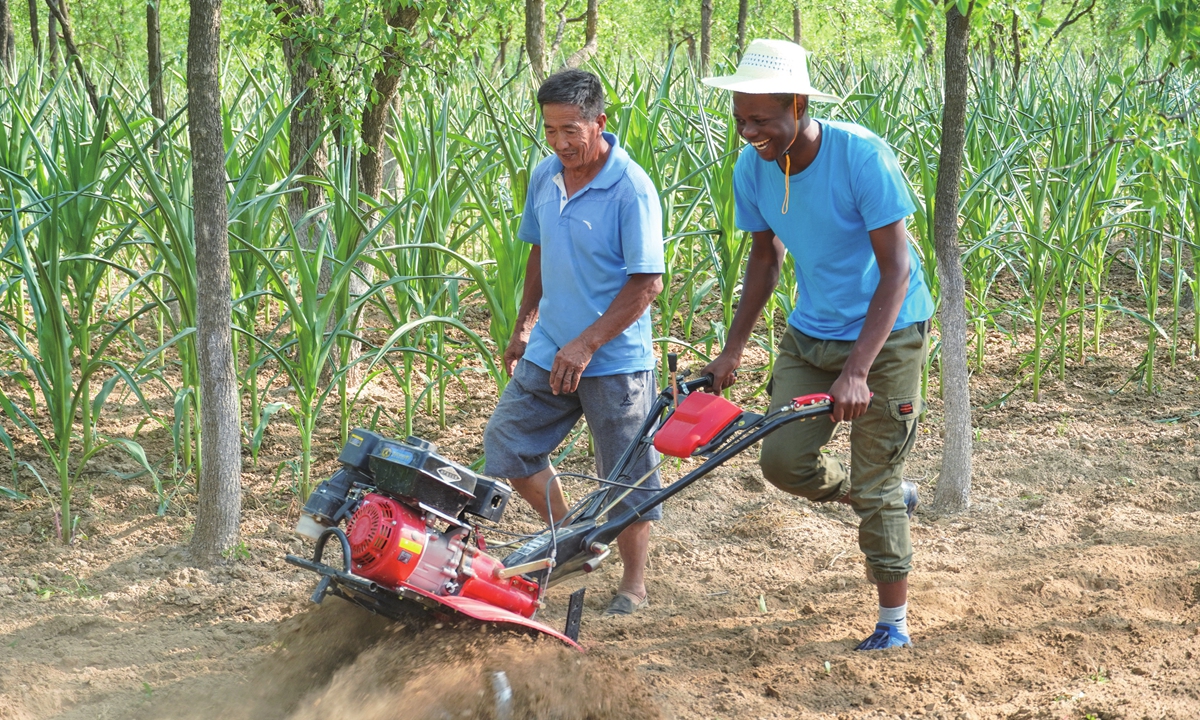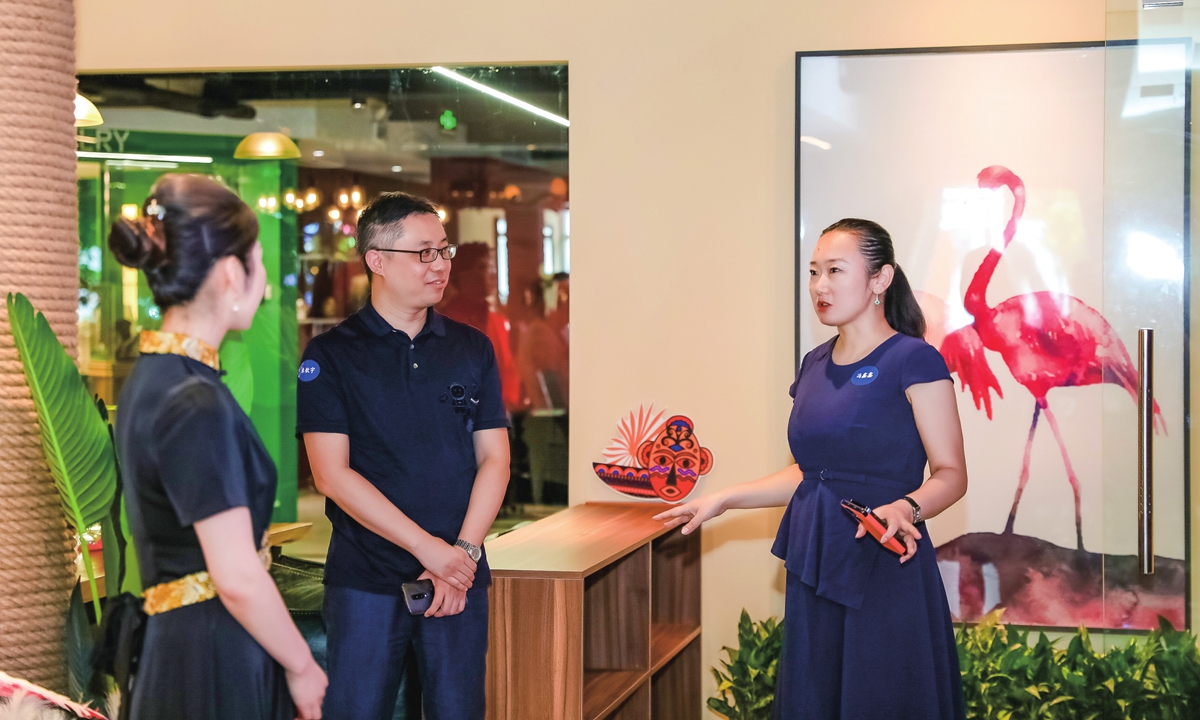
Tungamirai Eric Mupona tries his hand at farming in a village in North China's Shanxi Province in 2021. Photo: Courtesy of Tungamirai Eric Mupona
Editor's Note: Under the auspices of the 2024 Summit of the Forum on China-Africa Cooperation (FOCAC), the narratives of cultural and educational exchanges between China and Africa have become increasingly captivating. Serving as a bridge for people-to-people interactions, these exchanges have not only fostered mutual understanding but also deepened the emotional bonds between the two regions. During the FOCAC, a reporter from the Global Times interviewed African and Chinese cultural messengers, exploring how education and cultural activities can build a bridge of hearts between China and Africa.As Tungamirai Eric Mupona experienced rural areas in North China and Feng Xinxin kicked off her journey between China and Africa, they may not have noticed themselves taking on a new role - cultural envoys. Looking back, their endeavors have been valuable in people-to-people exchanges.
Favoring Chinese villages The story of Tungamirai Eric Mupona, a young man from Zimbabwe, exemplifies the experiences of African students furthering their education in China.
Raised in a rural village in northeastern Zimbabwe, Mupona's first glimpse into the distant world of China came through the stories and documentaries he watched on television at his uncle's house.
"I watched Chinese movies and many documentaries about China, which sparked an endless longing for this Eastern country," he told the Global Times. After graduating from high school in 2017, Mupona decided to pursue his studies in China, where he is currently working toward a PhD at Zhejiang University.
"Upon arriving in China, I couldn't speak Chinese and faced numerous challenges, but the warmth and help from teachers and classmates helped me adapt quickly," says Mupona. He shared that both in and out of the classroom, he has found a rich and fulfilling life, participating in discussions, dragon boat racing, and volunteering with his peers. "China's educational environment and academic standards are attracting more international students," he notes.
Beyond his academic pursuits, Mupona has always sought opportunities for social practice, particularly in China's rural areas. With questions about China's success in poverty alleviation and rural revitalization, he has traveled extensively through provinces such as East China's Zhejiang Province, North China's Shanxi Province and South China's Guangdong Province, sometimes spending an entire month in a village to take part in learning experiences.
In 2019, Mupona founded the APL Public Social Service Platform, primarily focusing on international youth exchanges and volunteer and fieldwork activities. "The development of rural China is very worthy of studying," he stated.
Mupona believes that the strong leadership of the Communist Party of China, the development of characteristic industries according to local conditions, and the stimulation of the internal drive of the masses are the inexhaustible forces behind rural revitalization and China's modernization. He speaks with evident pride and knowledge about what he has observed in China's countryside.
"China's practices have proven to the world that modernization is not a simple copy and paste… China's modernization offers a new paradigm to the world, one that starts from its actual conditions, suits its national context, and aims to develop for the people and relies on the people. I hope to bring back the experiences and lessons I've learned in China to Zimbabwe," he said.

Feng Xinxin (right) introduces the African exhibition hall to members of the Beijing Overseas Chinese Chamber of Commerce in 2022. Photo: Courtesy of Feng Xinxin
Making connections Tucked away in a cultural and creative park in northeast Beijing, there lies an African Cultural and Tourism Center. Here, visitors can savor authentic African coffee, peruse books about Africa, and admire African art, experiencing the charm and ambiance of Africa from all dimensions.
"Many people once harbored misconceptions about Africa. But through our efforts, they have changed their previous prejudices and are getting to know Africa anew," Feng Xinxin, the founder of the center, told the Global Times.Feng's journey with Africa began in 2008, shortly after her university graduation, with a desire to explore the world. She was struck by the vibrant energy and potential she found.
"At that time, Africa was much like China during the early stages of reform and opening-up, brimming with vitality and endless possibilities," she said. Feng recalled her first surprise while in Africa was the advanced 3G network that was supported by Huawei, a testament to the genuine assistance China has provided to the continent over the years, even surpassing the technology available in China where most people were still using 2G network at the time.
Feng's experience in Africa was transformative, leaving her with a deep appreciation for the continent's unique landscapes and relaxed pace of life. She was particularly captivated by the red deserts of Namibia, which offered a "serene escape from the world's troubles."
After a year working with a non-profit organization, Feng established a travel agency in Namibia, where she spent over a decade observing a fostering interest in African tourism among Chinese travelers.
In 2020, the COVID-19 pandemic brought Feng back to China, where she noticed Chinese people's limited understanding about Africa.
This realization prompted her to open the cultural center in Beijing, aiming to create a platform for cultural display, experience, and exchange.
This year, Feng returned to Africa with her five-month-old child.
"When I got off the plane holding my child, I didn't expect the locals to recognize me. They looked at my child with great affection, and they treated my child as one of their own. This is the kindness and warmth of the African people, which is very similar to us Chinese," she said with a big smile. This return also allowed Feng to discover some big changes the local infrastructure construction in Namibia has undergone in the last few years.
"China has helped Namibia build highways, ports, and other infrastructure, aiding it in becoming a regional logistics hub in southern Africa, where the investment environment and geographical advantages are gradually emerging," she said, calling this as a "symbol of the Belt and Road Initiative's promise of opportunity and a win-win for the future."





